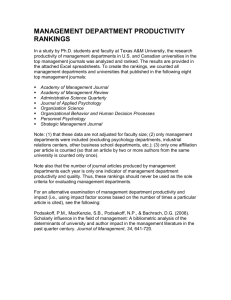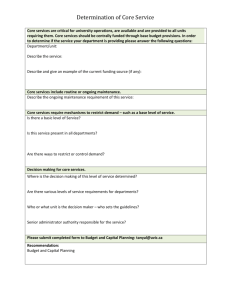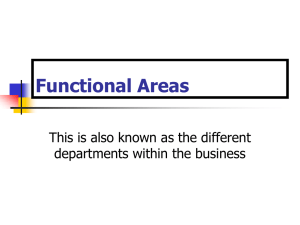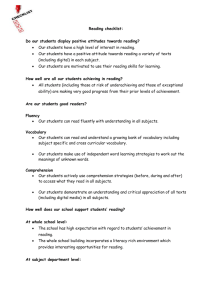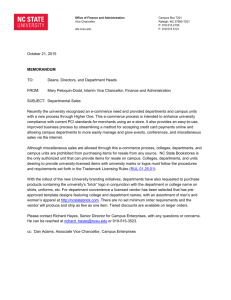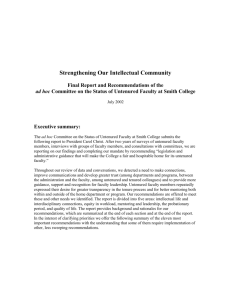Listening to Departments memo to campus
advertisement
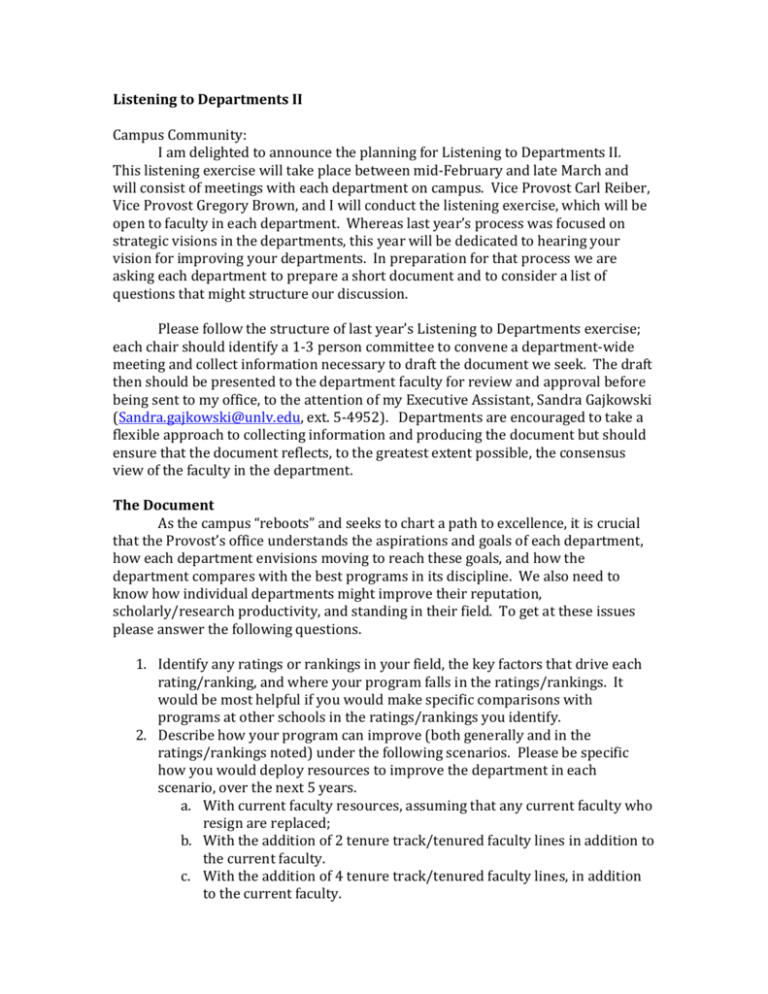
Listening to Departments II Campus Community: I am delighted to announce the planning for Listening to Departments II. This listening exercise will take place between mid-February and late March and will consist of meetings with each department on campus. Vice Provost Carl Reiber, Vice Provost Gregory Brown, and I will conduct the listening exercise, which will be open to faculty in each department. Whereas last year’s process was focused on strategic visions in the departments, this year will be dedicated to hearing your vision for improving your departments. In preparation for that process we are asking each department to prepare a short document and to consider a list of questions that might structure our discussion. Please follow the structure of last year’s Listening to Departments exercise; each chair should identify a 1-3 person committee to convene a department-wide meeting and collect information necessary to draft the document we seek. The draft then should be presented to the department faculty for review and approval before being sent to my office, to the attention of my Executive Assistant, Sandra Gajkowski (Sandra.gajkowski@unlv.edu, ext. 5-4952). Departments are encouraged to take a flexible approach to collecting information and producing the document but should ensure that the document reflects, to the greatest extent possible, the consensus view of the faculty in the department. The Document As the campus “reboots” and seeks to chart a path to excellence, it is crucial that the Provost’s office understands the aspirations and goals of each department, how each department envisions moving to reach these goals, and how the department compares with the best programs in its discipline. We also need to know how individual departments might improve their reputation, scholarly/research productivity, and standing in their field. To get at these issues please answer the following questions. 1. Identify any ratings or rankings in your field, the key factors that drive each rating/ranking, and where your program falls in the ratings/rankings. It would be most helpful if you would make specific comparisons with programs at other schools in the ratings/rankings you identify. 2. Describe how your program can improve (both generally and in the ratings/rankings noted) under the following scenarios. Please be specific how you would deploy resources to improve the department in each scenario, over the next 5 years. a. With current faculty resources, assuming that any current faculty who resign are replaced; b. With the addition of 2 tenure track/tenured faculty lines in addition to the current faculty. c. With the addition of 4 tenure track/tenured faculty lines, in addition to the current faculty. d. With the addition of 8 tenure track/tenured faculty lines, in addition to the current faculty.1 3. At each of the levels above, what would be the focus of the department? Please express as degree programs and research areas. Questions for our discussion The purpose of listening to departments is to hear what concerns you most; those concerns will drive our discussion. My office will schedule a department-wide meeting for this purpose. Any of the following questions would constitute valuable subjects for discussion, in addition to topics you want to raise. We will ask the first question listed below to start the meeting. 1. Describe how your department collaborated in forming responses to the document requested in this exercise. 2. Where relevant, please report on the effect of the support provided by the President after last year’s listening exercise. 3. What are the key achievements of your department over the last five years? 4. What are the key current initiatives currently being pursued by your department? How are they related to improving the department, its scholarly/research profile, its teaching effectiveness, or its reputation? 5. What are the major challenges facing the department? 6. Describe any cross-disciplinary/collaborative initiatives undertaken with other departments at UNLV or with other higher education institutions and relate the benefits of those efforts. 7. Describe any impediments to faculty research success/productivity and offer suggestions for eliminating them. 8. Describe any impediments to teaching and research collaboration on campus and across the academy. 9. How can we help improve mentoring and faculty development within your department? 10. How can we better help you engage community partnerships that relate to and might improve the research and scholarship of department members? For larger departments, please complete the report based on 0, 4, 8, and 16, additional tenure track/tenured faculty lines. 1
